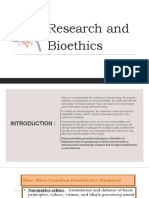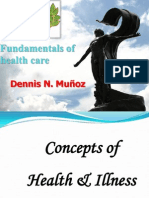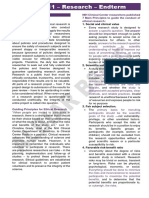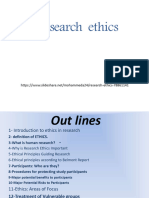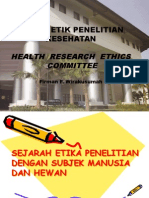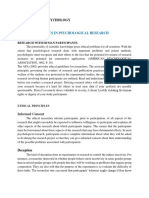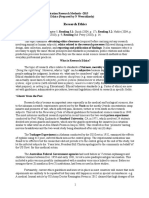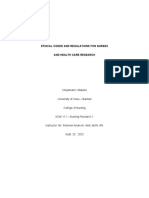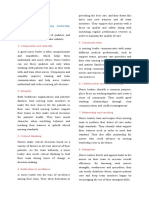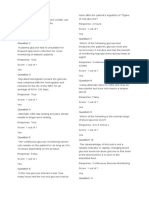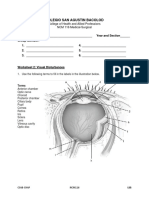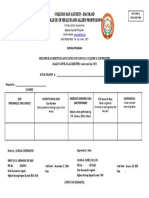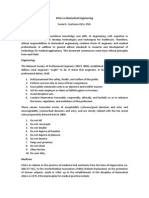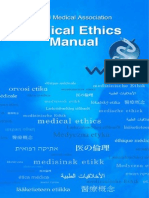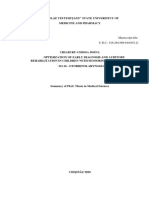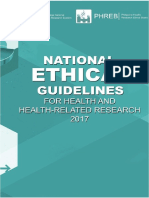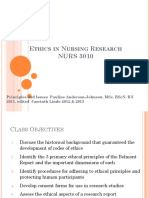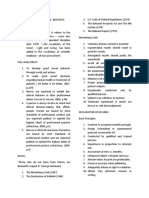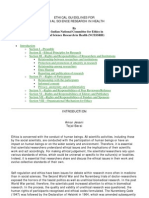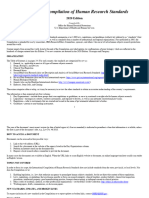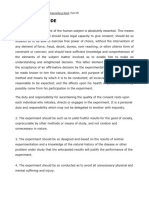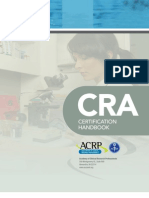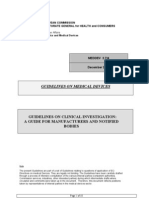Ethics in Research
Ethics in Research
Uploaded by
Jmarie Brillantes PopiocoCopyright:
Available Formats
Ethics in Research
Ethics in Research
Uploaded by
Jmarie Brillantes PopiocoOriginal Title
Copyright
Available Formats
Share this document
Did you find this document useful?
Is this content inappropriate?
Copyright:
Available Formats
Ethics in Research
Ethics in Research
Uploaded by
Jmarie Brillantes PopiocoCopyright:
Available Formats
1 Colegio de San Agustin-Bacolod College of Health & Allied Professionals.
HEALTHCARE ETHICS
MODULE 1:
ETHICS IN RESEARCH
Why study Research?
Knowing what constitutes ethical research is important for all people who conduct research
projects or use and apply the results from research findings. All researchers should be familiar
with the basic ethical principles and have up-to-date knowledge about policies and procedures
designed to ensure the safety of research subjects and to prevent sloppy or irresponsible
research, because ignorance of policies designed to protect research subjects is not considered
a viable excuse for ethically questionable projects. Therefore, the duty lies with the researcher
to seek out and fully understand the policies and theories designed to guarantee upstanding
research practices. Research is a public trust that must be ethically conducted, trustworthy, and
socially responsible if the results are to be valuable. All parts of a research project – from 7 the
project design to submission of the results for peer review – have to be upstanding in order to
be considered ethical. When even one part of a research project is questionable or conducted
unethically, the integrity of the entire project is called into question.
Guiding Principles for Ethical Research
“When people are invited to participate in research, there
is a strong belief that it should be their choice based on
their understanding of what the study is about, and what
the risks and benefits of the study are,” said Dr. Christine
Grady, chief of the NIH Clinical Center Department of
Bioethics, to Clinical Center Radio in a podcast.
Clinical research advances the understanding of science and promotes human health. However, it
is important to remember the individuals who volunteer to participate in research. There are
precautions researchers can take – in the planning, implementation and follow-up of studies – to
protect these participants in research. Ethical guidelines are established for clinical research to
protect patient volunteers and to preserve the integrity of the science.
MODULE 1. NCM 108 Endterm Coverage Eden Shiz Parpa, RN,MAN
Colegio de San Agustin-Bacolod College of Health & Allied Professionals. HEALTHCARE ETHICS 2
NIH Clinical Center researchers published seven main principles to guide the conduct of ethical
research:
Social and clinical value
Every research study is designed to answer a specific question. The answer should be important
enough to justify asking people to accept some risk or inconvenience for others. In other words,
answers to the research question should contribute to scientific understanding of health or
improve our ways of preventing, treating, or caring for people with a given disease to justify
exposing participants to the risk and burden of research.
Scientific validity
A study should be designed in a way that will get an understandable answer to the important
research question. This includes considering whether the question asked is answerable, whether
the research methods are valid and feasible, and whether the study is designed with accepted
principles, clear methods, and reliable practices. Invalid research is unethical because it is a
waste of resources and exposes people to risk for no purpose
Fair subject selection
The primary basis for recruiting participants should be the scientific goals of the study — not
vulnerability, privilege, or other unrelated factors. Participants who accept the risks of research
should be in a position to enjoy its benefits. Specific groups of participants (for example, women
or children) should not be excluded from the research opportunities without a good scientific
reason or a particular susceptibility to risk.
Favorable risk-benefit ratio
Uncertainty about the degree of risks and benefits associated with a clinical research study is
inherent. Research risks may be trivial or serious, transient or long-term. Risks can be physical,
psychological, economic, or social. Everything should be done to minimize the risks and
inconvenience to research participants to maximize the potential benefits, and to determine that
the potential benefits are proportionate to, or outweigh, the risks.
Independent review
To minimize potential conflicts of interest and make sure a study is ethically acceptable before it
starts, an independent review panel should review the proposal and ask important questions,
including: Are those conducting the trial sufficiently free of bias? Is the study doing all it can to
protect research participants? Has the trial been ethically designed and is the risk–benefit ratio
favorable? The panel also monitors a study while it is ongoing.
Informed consent
Potential participants should make their own decision about whether they want to participate or
continue participating in research. This is done through a process of informed consent in which
individuals (1) are accurately informed of the purpose, methods, risks, benefits, and alternatives
to the research, (2) understand this information and how it relates to their own clinical situation
or interests, and (3) make a voluntary decision about whether to participate.
MODULE 1. NCM 108 Endterm Coverage Eden Shiz Parpa, RN,MAN
3 Colegio de San Agustin-Bacolod College of Health & Allied Professionals. HEALTHCARE ETHICS
Respect for potential and enrolled participants
Individuals should be treated with respect from the time they are approached for possible
participation — even if they refuse enrollment in a study — throughout their participation and
after their participation ends. This includes:
respecting their privacy and keeping their private information confidential
respecting their right to change their mind, to decide that the research does not match
their interests, and to withdraw without a penalty
informing them of new information that might emerge in the course of research, which
might change their assessment of the risks and benefits of participating
monitoring their welfare and, if they experience adverse reactions, unexpected effects, or
changes in clinical status, ensuring appropriate treatment and, when necessary, removal
from the study
informing them about what was learned from the research
Worth some thoughtful reflections..
1. What current issues you have observed that
signifies certain confusion or misinterpretation of
the principles stated by the National Insitute for
Health (NIH)?
DISCUSSION FORUM:
Join in the discussion forum in your LMS. Share your insights in not less than 3
sentences; make it clear, interesting and sincere.
ONLINE SURVEY:
Fill out a quick survey to indicate your impression, stand or thoughts on the
relevant issues and scenarios provided.
MODULE 1. NCM 108 Endterm Coverage Eden Shiz Parpa, RN,MAN
Colegio de San Agustin-Bacolod College of Health & Allied Professionals. HEALTHCARE ETHICS 4
Research ethics provides guidelines for the responsible conduct of biomedical research. In
addition, research ethics educates and monitors scientists conducting research to ensure a high
ethical standard.
BRIEF HISTORY The birth of modern research ethics began with a desire to protect
human subjects involved in research projects. The first attempt to craft regulations began
during the Doctors Trial of 1946-1947. The Doctors Trial was a segment of the Nuremberg Trials
for Nazi war criminals (see photo* ). In the Doctors Trial, 23 German Nazi physicians were
accused of conducting abhorrent and torturous “experiments” with concentration camp
inmates. The accused physicians tortured, brutalized, crippled, and murdered thousands of
victims in the name of research. Some of their experiments involved gathering scientific
information about the limits of the human body by exposing victims to extreme temperatures
and altitudes. The most gruesome and destructive experiments tested how quickly a human
could be euthanatized in order to carry out the Nazi racial purification policies most efficiently.
To prosecute the accused Nazi doctors for the atrocities they committed, a list of ethical
guidelines for the conduct of research – the Nuremberg Code – were developed. * Thomas J.
Dodd Papers website. http://www.lib.uconn.edu/DoddCenter/ASC/dodphot1.htm. Accessed
2/05/03. 4
The Nuremberg Code consisted of ten basic ethical principles that the accused violated.1 The
10 guidelines were as follows:
1. Research participants must voluntarily consent to research participation
2. Research aims should contribute to the good of society
3. Research must be based on sound theory and prior animal testing
4. Research must avoid unnecessary physical and mental suffering
5. No research projects can go forward where serious injury and/or death are potential
outcomes
6. The degree of risk taken with research participants cannot exceed anticipated benefits of
results
7. Proper environment and protection for participants is necessary
8. Experiments can be conducted only by scientifically qualified persons
9. Human subjects must be allowed to discontinue their participation at any time
MODULE 1. NCM 108 Endterm Coverage Eden Shiz Parpa, RN,MAN
5 Colegio de San Agustin-Bacolod College of Health & Allied Professionals. HEALTHCARE ETHICS
10. Scientists must be prepared to terminate the experiment if there is cause to believe that
continuation will be harmful or result in injury or death The Nuremberg Guidelines paved the
way for the next major initiative designed to promote responsible research with human
subjects, the Helsinki Declaration.
The Helsinki Declaration was developed by the World Medical Association and has been
revised and updated periodically since 1964, with the last update occurring in 2000.
The document lays out basic ethical principles for conducting biomedical research and specifies
guidelines for research conducted either by a physician, in conjunction with medical care, or
within a clinical setting. The Helsinki Declaration contains all the basic ethical elements
specified in the Nuremberg Code but then advances further guidelines specifically designed to
address 5 the unique vulnerabilities of human subjects solicited to participate in clinical
research projects.
The unique principles developed within the Helsinki Declaration include:
• The necessity of using an independent investigator to review potential research projects
• Employing a medically qualified person to supervise the research and assume responsibility
for the health and welfare of human subjects
• The importance of preserving the accuracy of research results
• Suggestions on how to obtain informed consent from research participants
• Rules concerning research with children and mentally incompetent persons
• Evaluating and using experimental treatments on patients
The importance of determining which medical situations and conditions are appropriate and
safe for research Following the Helsinki Declaration, the next set of research ethics guidelines
came out in the Belmont Report of 1979 from the National Commission for the Protection of
Human Subjects of Biomedical and Behavioral Research.
The report outlines:
1. The ethical principles for research with human subjects
2. Boundaries between medical practice and research
3. The concepts of respect for persons, beneficence, and justice
4. Applications of these principles in informed consent (respect for persons), assessing risks
and benefits (beneficence), and subject selection (justice)3
The Nuremberg, Helsinki, and Belmont guidelines provided the foundation of more ethically
uniform research to which stringent rules and consequences for violation were attached.
MODULE 1. NCM 108 Endterm Coverage Eden Shiz Parpa, RN,MAN
Colegio de San Agustin-Bacolod College of Health & Allied Professionals. HEALTHCARE ETHICS 6
Governmental laws and regulations concerning the responsible conduct of research have since
been developed for research that involves both human and animal 6 subjects.
The Animal Welfare Act provides guidelines and regulations for research with animals. It goes
into detail about sale, licensure, facilities, transport, and other care instructions. For research
with human subjects Title 45, Part 46 from the Code of Federal Regulations (45 CFR 46): The
Protection of Human Subjects Regulations outlines the purpose and policies of Institutional
Review Board (IRB) oversight and approval, informed consent, and protections and policies for
research with children, pregnant women, fetuses, prisoners, and mentally incompetent
individuals. Currently, the focus of research ethics lies in the education of researchers
regarding the ethical principles behind regulations as well as the oversight and review of
current and potential research projects. The field has expanded from providing protections for
human subjects to including ethical guidelines that encompass all parts of research from
research design to the truthful reporting of results. There are several avenues for people who
wish to seek education on basic ethical principles, and avenues for education on how to
comply with policies at the institutional, state, and national levels. The University of
Minnesota’s Center for Bioethics (www.bioethics.umn.edu) and many other universities and
professional associations around the country continually offer education for researchers and
scientists on ethical research issues. Curriculum is available in frequently offered conferences,
classroom settings, and on-line (www.research.umn.edu/curriculum).
BELMONT REPORT https://www.youtube.com/watch?v=M6AKIIhoFn4
Worth some thoughtful reflections..
2. How has the Nuremberg, Helsinki and Belmont
Guidelines established the conduct of Research
that made progress in science and technology a
worthy endeavor?
DISCUSSION FORUM:
Join in the discussion forum in your LMS. Share your insights in not less than 3
sentences; make it clear, interesting and sincere.
READ FURTHER :
Take time to read through this article .
https://www.researchgate.net/publication/11631736
MODULE 1. NCM 108 Endterm Coverage Eden Shiz Parpa, RN,MAN
You might also like
- Bioethics MidtermDocument104 pagesBioethics MidtermJmarie Brillantes Popioco90% (10)
- INFORMATICS MIDTERM W QuizDocument62 pagesINFORMATICS MIDTERM W QuizJmarie Brillantes PopiocoNo ratings yet
- Bioethics and Research PowerpointDocument37 pagesBioethics and Research PowerpointSusan Maglaqui100% (2)
- Biomedical EngineeringDocument5 pagesBiomedical EngineeringFranch Maverick Arellano Lorilla100% (1)
- Ethical Issues With Informed Consent (Escobedo, 2007) PDFDocument8 pagesEthical Issues With Informed Consent (Escobedo, 2007) PDFMuhammad YusarNo ratings yet
- Idioms Meaning ExampleDocument6 pagesIdioms Meaning ExampleLuciferNo ratings yet
- GRP-1-RLE-Report-on-Staffing (1) RevisedDocument66 pagesGRP-1-RLE-Report-on-Staffing (1) RevisedNoamiNo ratings yet
- General Orientation PDFDocument62 pagesGeneral Orientation PDFkiki parkNo ratings yet
- Lesson 5 - Planning For Health Promotion and MaintenanceDocument40 pagesLesson 5 - Planning For Health Promotion and MaintenancehaledominiseNo ratings yet
- SchizophreniaDocument36 pagesSchizophreniasanyakotwani08No ratings yet
- SchizophreniaDocument13 pagesSchizophreniaapi-287575009No ratings yet
- Level 3 Self Assessment Geriatric Nursing 1Document34 pagesLevel 3 Self Assessment Geriatric Nursing 1Orlea Francisco-SisioNo ratings yet
- Critical Thinking MLE 2011Document439 pagesCritical Thinking MLE 2011chuppepay100% (1)
- Pentagon - PediatricDocument51 pagesPentagon - PediatricJanna Marie UntalanNo ratings yet
- PharmaDocument101 pagesPharmaChristine Matas100% (1)
- Group 6 Middle AdulthoodDocument79 pagesGroup 6 Middle AdulthoodAlthea MoyaNo ratings yet
- Code of Ethics For Teachers PDFDocument10 pagesCode of Ethics For Teachers PDFMevelle Laranjo AsuncionNo ratings yet
- CDC - Public Health Informatics CompetenciesDocument2 pagesCDC - Public Health Informatics CompetenciesRobert RobinsonNo ratings yet
- Chapter 35 - Administering MedicationsDocument77 pagesChapter 35 - Administering Medicationsoking4831No ratings yet
- Physiological Aging: Artizuela, Marisol O'Dell, Andrea Romero, Erra Lee Sese, Kameron Gayla Pangilinan, Kenneth ChristianDocument12 pagesPhysiological Aging: Artizuela, Marisol O'Dell, Andrea Romero, Erra Lee Sese, Kameron Gayla Pangilinan, Kenneth ChristianAndrea Isabel U. O'DellNo ratings yet
- Module 3Document6 pagesModule 3Sheera MangcoNo ratings yet
- Research - FinalsDocument6 pagesResearch - FinalsYema AlbiarNo ratings yet
- CHAPTER 6Document21 pagesCHAPTER 6Warner Yague Pacariem Jr.No ratings yet
- Ethics in Clinical ResearchDocument3 pagesEthics in Clinical ResearchAPLCTN100% (1)
- Ethical Issues in ResearchDocument4 pagesEthical Issues in ResearchLorraine Tuesday BuenviajeNo ratings yet
- Research EthicsDocument52 pagesResearch EthicsEvette MisagalNo ratings yet
- Learning Unit 5A (1)Document39 pagesLearning Unit 5A (1)makatemoleboheng9No ratings yet
- Ethics in Nursing ResearchDocument24 pagesEthics in Nursing Researchsamah AlblawiNo ratings yet
- Ethics in Research ArchanaDocument50 pagesEthics in Research ArchanaArchana MoreyNo ratings yet
- ResearchDocument155 pagesResearcholaboutacademicsNo ratings yet
- 5 Ethics EditedDocument43 pages5 Ethics EditedKhae PadiernosNo ratings yet
- 02 Ethics in Research 2024Document51 pages02 Ethics in Research 2024Vonne Denesse MaganteNo ratings yet
- Reserach Ethics and Thesis Report 06.04Document2 pagesReserach Ethics and Thesis Report 06.04sab sabknuNo ratings yet
- Clinicals MergedDocument666 pagesClinicals MergedaaliyanzeeNo ratings yet
- ICMRDocument18 pagesICMRKinjal SharmaNo ratings yet
- Psy1022 - Week 4Document14 pagesPsy1022 - Week 4Jezza JonesNo ratings yet
- Kuliah KEPK 2015 Prof. FirmanDocument203 pagesKuliah KEPK 2015 Prof. FirmanDian WijayantiNo ratings yet
- Pines City Colleges: College of NursingDocument7 pagesPines City Colleges: College of NursingMara Jon Ocden CasibenNo ratings yet
- Humanexperimentation: Presented by Christopher Charles WamburaDocument29 pagesHumanexperimentation: Presented by Christopher Charles WamburaChris CharzNo ratings yet
- Mod 4 Bioethics and ResearchDocument18 pagesMod 4 Bioethics and ResearchKyle PalparanNo ratings yet
- Ethical Consideration in ResearchDocument38 pagesEthical Consideration in ResearchSudharani B Banappagoudar100% (2)
- Lecture 7Document34 pagesLecture 7gokulkrishnayadhavNo ratings yet
- Chapter 3 - Ethics of Research in Psychology and PsychiatryDocument4 pagesChapter 3 - Ethics of Research in Psychology and PsychiatryScribdTranslationsNo ratings yet
- Annotated Bibliography For Ethics in Research: Submitted To Submitted BYDocument6 pagesAnnotated Bibliography For Ethics in Research: Submitted To Submitted BYShubha JeniferNo ratings yet
- RESEARCH ETHICS (SHORT ESSAY QUESTION)Document5 pagesRESEARCH ETHICS (SHORT ESSAY QUESTION)arslanhussain64No ratings yet
- Introduction To EthicsDocument11 pagesIntroduction To EthicsNurun NabiNo ratings yet
- Module.3.ethics in Psychological ResearchDocument4 pagesModule.3.ethics in Psychological ResearchJhonel NautanNo ratings yet
- Declaration of HelsinkiDocument11 pagesDeclaration of HelsinkiYzel Vasquez AdavanNo ratings yet
- Bioethics FinalsDocument156 pagesBioethics FinalsAngel JagongNo ratings yet
- Research Ethics: Systems Legal Systems (With Relevant Laws in Place) Research Context (Why Done, With Whom and ForDocument9 pagesResearch Ethics: Systems Legal Systems (With Relevant Laws in Place) Research Context (Why Done, With Whom and ForJohn ChivNo ratings yet
- Declaration of HelsinkiDocument18 pagesDeclaration of HelsinkiakivedNo ratings yet
- Chapter 2-Ethical Issues in Nursing ResearchDocument43 pagesChapter 2-Ethical Issues in Nursing Researchalhader libraryNo ratings yet
- Ethical Coded and Regulations For NursesDocument5 pagesEthical Coded and Regulations For NursesKhylamarie VillalunaNo ratings yet
- Ethical Principles in Nursing ResearchDocument4 pagesEthical Principles in Nursing ResearchMegan Rose MontillaNo ratings yet
- Lesson 4 Research-EthicsDocument5 pagesLesson 4 Research-EthicsMarie Frances SaysonNo ratings yet
- 5 Research Ethics 2Document7 pages5 Research Ethics 2xan pitchuNo ratings yet
- BMS 325 - Guidelines For Ethical Clinical ResearchDocument18 pagesBMS 325 - Guidelines For Ethical Clinical Researchs-mohamed.akmalNo ratings yet
- 11-Ethical Issues For 13 BatchDocument27 pages11-Ethical Issues For 13 Batchmohon_eee03No ratings yet
- Ethical Considerations in Psychology ResearchDocument14 pagesEthical Considerations in Psychology Researchsupanpreet9986No ratings yet
- 2024 WMA Declaration of Helsinki Ethical Principles For Medical Research Involving Human SubjectsDocument6 pages2024 WMA Declaration of Helsinki Ethical Principles For Medical Research Involving Human SubjectsclarangontamackNo ratings yet
- Principles of Ethics in Clinical Trials-Prof. Dr. Dr. Rianto Setiabudy, SPFKDocument23 pagesPrinciples of Ethics in Clinical Trials-Prof. Dr. Dr. Rianto Setiabudy, SPFKJoko WinarnoNo ratings yet
- Ethics of ResearchDocument10 pagesEthics of ResearchAiman Ameer PiaNo ratings yet
- Basic Research Ethics LPA 18aug2017Document41 pagesBasic Research Ethics LPA 18aug2017Jayson-kun LopezNo ratings yet
- Pre Op BabyDocument3 pagesPre Op BabyJmarie Brillantes PopiocoNo ratings yet
- Important Reminders: Step 1Document4 pagesImportant Reminders: Step 1Jmarie Brillantes PopiocoNo ratings yet
- Leadership and Manangement - Notes 1Document6 pagesLeadership and Manangement - Notes 1Jmarie Brillantes PopiocoNo ratings yet
- Week 3 and 4Document84 pagesWeek 3 and 4Jmarie Brillantes PopiocoNo ratings yet
- Skills LabDocument5 pagesSkills LabJmarie Brillantes PopiocoNo ratings yet
- Afghan AmericansDocument35 pagesAfghan AmericansJmarie Brillantes PopiocoNo ratings yet
- Colegio San Agustin Bacolod: College of Health and Allied Professions NCM 116 Medical-SurgicalDocument3 pagesColegio San Agustin Bacolod: College of Health and Allied Professions NCM 116 Medical-SurgicalJmarie Brillantes PopiocoNo ratings yet
- Managing Blood Transfusion Purposes:: Excellent Very Good Good Fair PoorDocument9 pagesManaging Blood Transfusion Purposes:: Excellent Very Good Good Fair PoorJmarie Brillantes PopiocoNo ratings yet
- Caring of Client With Immobilization DevicesDocument6 pagesCaring of Client With Immobilization DevicesJmarie Brillantes PopiocoNo ratings yet
- Colegio San Agustin - Bacolod College of Health and Allied ProfessionsDocument1 pageColegio San Agustin - Bacolod College of Health and Allied ProfessionsJmarie Brillantes PopiocoNo ratings yet
- Performing Nasopharyngeal/Nasotracheal Suctioning Purposes:: Excellent Very Good Good Fair PoorDocument6 pagesPerforming Nasopharyngeal/Nasotracheal Suctioning Purposes:: Excellent Very Good Good Fair PoorJmarie Brillantes PopiocoNo ratings yet
- Osteoporosis: Risk FactorsDocument7 pagesOsteoporosis: Risk FactorsJmarie Brillantes PopiocoNo ratings yet
- Medical Abbreviation TermsDocument7 pagesMedical Abbreviation TermsJmarie Brillantes PopiocoNo ratings yet
- CHN - Intro Concept PrinciplesDocument62 pagesCHN - Intro Concept PrinciplesJmarie Brillantes PopiocoNo ratings yet
- Preoperative Nursing 2021Document18 pagesPreoperative Nursing 2021Jmarie Brillantes Popioco100% (1)
- 2 A Healthy CommunityDocument12 pages2 A Healthy CommunityJmarie Brillantes PopiocoNo ratings yet
- NCM 114 Gerontology - WeeK 1Document38 pagesNCM 114 Gerontology - WeeK 1Jmarie Brillantes Popioco0% (1)
- Intraoperative Phase 2021Document62 pagesIntraoperative Phase 2021Jmarie Brillantes PopiocoNo ratings yet
- Perioperative Nursing: Lecturer: Mr. Renato D. Lacanilao, RN, MANDocument27 pagesPerioperative Nursing: Lecturer: Mr. Renato D. Lacanilao, RN, MANJmarie Brillantes PopiocoNo ratings yet
- THEO MIDTERM W QuizzesDocument19 pagesTHEO MIDTERM W QuizzesJmarie Brillantes PopiocoNo ratings yet
- Anesthesia: Mr. Renato D. Lacanilao, RN, MAN LecturerDocument25 pagesAnesthesia: Mr. Renato D. Lacanilao, RN, MAN LecturerJmarie Brillantes Popioco100% (1)
- Vaccine Access and Hesitancy: The Public Health Importance of VaccinesDocument30 pagesVaccine Access and Hesitancy: The Public Health Importance of VaccinesJmarie Brillantes PopiocoNo ratings yet
- Postoperative Phase 2021Document56 pagesPostoperative Phase 2021Jmarie Brillantes Popioco100% (1)
- Ethics in Nursing Leadership: Transactional, Transformational, and Authentic Leadership Are Popular ModelsDocument10 pagesEthics in Nursing Leadership: Transactional, Transformational, and Authentic Leadership Are Popular ModelsJmarie Brillantes PopiocoNo ratings yet
- C. Disorders of The Lowel BowelDocument69 pagesC. Disorders of The Lowel BowelJmarie Brillantes PopiocoNo ratings yet
- Ethics in Research: Historical OverviewDocument9 pagesEthics in Research: Historical OverviewJmarie Brillantes PopiocoNo ratings yet
- Untitled DocumentDocument26 pagesUntitled DocumentJmarie Brillantes PopiocoNo ratings yet
- Assessment and ManagementDocument23 pagesAssessment and ManagementJmarie Brillantes PopiocoNo ratings yet
- Etika Penelitian Pada ManusiaDocument32 pagesEtika Penelitian Pada ManusiaAhmad NazharNo ratings yet
- Biomedical Engineering EthicsDocument2 pagesBiomedical Engineering EthicsgloriaMontoyaNo ratings yet
- Wma Medical Ethics ManualDocument71 pagesWma Medical Ethics ManualMatin Ahmad KhanNo ratings yet
- 602733b28c131c002f701731 1613181994 LESSON 5 Ethics in ResearchDocument32 pages602733b28c131c002f701731 1613181994 LESSON 5 Ethics in ResearchTeam KapappiesNo ratings yet
- Declaration of HelsinkiDocument7 pagesDeclaration of HelsinkiTausif AlamNo ratings yet
- Research IntegrityDocument74 pagesResearch Integritycharlsandroid01100% (2)
- Bioethics and ResearchDocument25 pagesBioethics and Researchhanna castueraNo ratings yet
- 7.1 Ethics in ScienceDocument17 pages7.1 Ethics in ScienceJessieNo ratings yet
- Ethics in Nursing ResearchDocument24 pagesEthics in Nursing Researchsamah AlblawiNo ratings yet
- Bioethics, Vulnerability, and Protection: Ruth MacklinDocument15 pagesBioethics, Vulnerability, and Protection: Ruth MacklinMarisa Domínguez GonzálezNo ratings yet
- Introduction To Research Integrity (Research Ethics) ME790: Dr. Hazem ZibdehDocument13 pagesIntroduction To Research Integrity (Research Ethics) ME790: Dr. Hazem ZibdehAnas ShatnawiNo ratings yet
- Doina Chiaburu-Chiosa Abstract enDocument25 pagesDoina Chiaburu-Chiosa Abstract enАлинаОсадчук-ФердохлебNo ratings yet
- 2017 National Ethical Guidelines For Health and Health-Related Research PDFDocument284 pages2017 National Ethical Guidelines For Health and Health-Related Research PDFPatricia EnriquezNo ratings yet
- Aswin NairDocument38 pagesAswin NairmanikandanNo ratings yet
- E N R NURS 3010: Thics in Ursing EsearchDocument30 pagesE N R NURS 3010: Thics in Ursing EsearchKrizza Mae CanoneoNo ratings yet
- BioethicsDocument2 pagesBioethicsJannen CasasNo ratings yet
- Medical Translation PDFDocument29 pagesMedical Translation PDFkltm azzNo ratings yet
- Ethical Guidelines For Social Science ResearchDocument15 pagesEthical Guidelines For Social Science ResearchAmit ChoudharyNo ratings yet
- Ethical Concerns Regarding Research On Human SubjectsDocument6 pagesEthical Concerns Regarding Research On Human SubjectsEditor IJTSRDNo ratings yet
- Introduction To ICH GCPDocument15 pagesIntroduction To ICH GCPSwapnil BhowateNo ratings yet
- 2020 International Compilation of Human Research StandardsDocument198 pages2020 International Compilation of Human Research StandardsSchmoutNo ratings yet
- Export Module 2.1 2021-08-17 1019Document73 pagesExport Module 2.1 2021-08-17 1019lesegomasalesa99No ratings yet
- Nuremberg 1Document23 pagesNuremberg 1pradhansnehasis382No ratings yet
- Declaration of Helsinki: PreambleDocument6 pagesDeclaration of Helsinki: PreamblePrincess Alane MorenoNo ratings yet
- Bioethics in ResearchDocument44 pagesBioethics in ResearchJonathan100% (1)
- Domestic Violence Act Submission Murray Bacon Revi 43Document397 pagesDomestic Violence Act Submission Murray Bacon Revi 43MuzzaBeeNo ratings yet
- Cra Certification GuideDocument42 pagesCra Certification GuideMoxa PatelNo ratings yet
- Meddev 2.7 4Document10 pagesMeddev 2.7 4Jug_HustlerNo ratings yet
- Etika Penelitian Klinis (DR Rizka Andalucia)Document25 pagesEtika Penelitian Klinis (DR Rizka Andalucia)rmartiyasihNo ratings yet


